
Despite having been asymptomatic, a woman infected with the coronavirus in Washington state in the US, is reported to have shed infectious virus particles for 70 days. She was contagious during that entire time.
Science Alert reported the 71-year-old woman suffered from leukemia, her immune system was thus weakened and less able to clear her body of the novel coronavirus.
Although researchers have suspected that people with weakened immune systems may shed the virus for longer than typical, there wasn’t much evidence to support this, until now. The findings contradict CDC guidelines, which say that immunocompromised people with COVID-19 are likely to NOT be infectious after 20 days.
The authors wrote in their paper, published on Wednesday, that their findings suggest “long-term shedding of infectious virus may be a concern in certain immunocompromised patients.”
The woman was infected in late February during the United States first reported COVID-19 outbreak. She was hospitalized for anemia related to her leukemia, on February 25. She tested positive on March 2. According to Science Alert, over the next 15 weeks, the woman was tested for COVID-19 more than a dozen times. The virus was detected in her upper respiratory tract for 105 days; and infectious virus particle were detected for at least 70 days. Previously, the longest duration of infectious virus shedding in a COVID-19 patient was reported to be 20 days.
The woman is believed to have been contagious for such a lengthy amount of time because her body didn’t mount a proper immune response. Exactly how the woman cleared the virus is unknown.
Researchers don’t know why the woman did not experience symptoms of COVID-19 despite being immunocompromised, which would be expected to have put her at higher risk of severe disease.
Further, only 105 days after her initial diagnosis did she test negative.
Umm Muhammed Umar







0 Comments